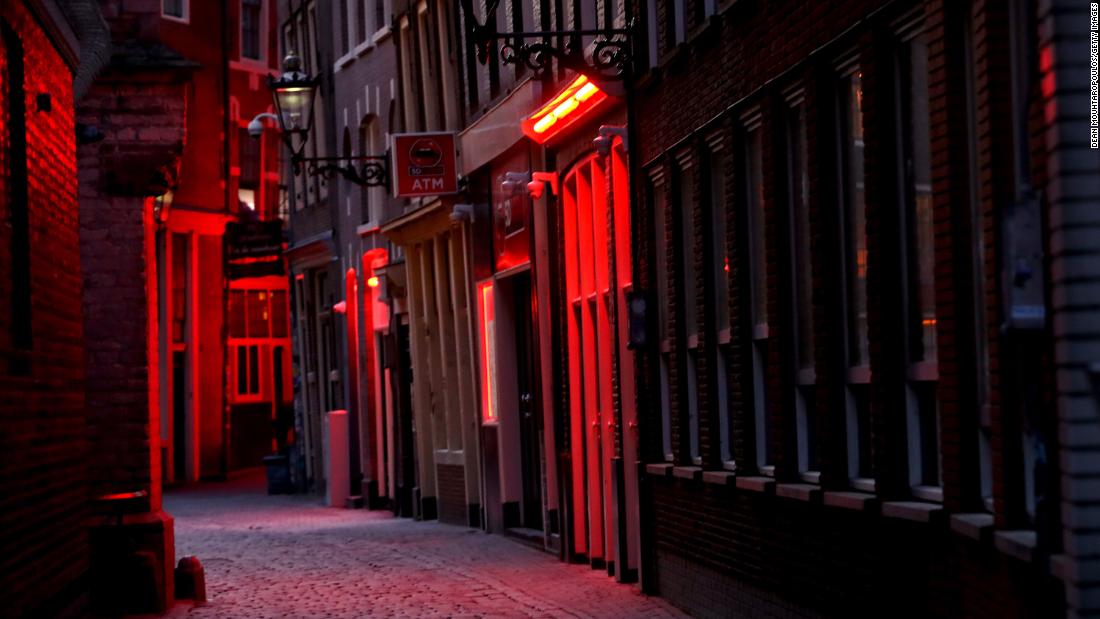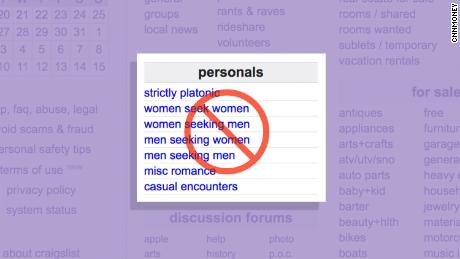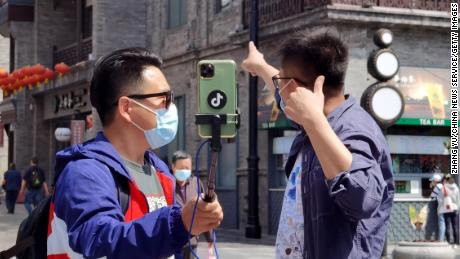An old economics axiom claims that investments in “vice” and “sin” like gambling, alcohol, drugs and sex trades weather economic downturns well, because people turn to them whether they’re sad or happy. Some vices are even thought to be countercyclical, rising when economy takes a nosedive.
Less work, more risk
Lockdown orders might seem redundant for an already forbidden business, but several sex workers told CNN that they had chosen to stop working due to fear of the coronavirus.
Demand from clients has chilled too, and as unemployment in the US reaches Great Depression-levels, many Americans have less to spend on services of all kinds. Nevertheless, every sex worker interviewed said they were still receiving requests to meet in person — if not as frequently as before.
“It’s my ethical duty to not work on anyone’s body because of the virus,” said one San Francisco-based sex worker and massage therapist, who said they’d gone from seeing more than 30 clients per week to zero.
“I’ve lived in my apartment for 16 years, like, I’ve never paid rent late or ever. This is the first time I’m ever having to struggle with money while I’ve been in San Francisco,” they said. In March, they reached out to advocacy group Black Sex Workers’ Collective for financial help, receiving an emergency $400 grant to fund basic living expenses.
Yet this worker says they continue to be contacted by prospective clients — including from doctors and nurses at the hospital down the street. “They’re like begging you to work with them,” they said. “They’re throwing up all this money at you, like I’ll give you $300 to work for me for an hour. It’s a dilemma for me, because I need the money.”
While high-end workers may have been able to build a financial cushion before the crisis, many lower-end workers were already living day-to-day — and now their customers are more likely to be laid off, he says. “As you move down the wage distribution for sex workers, there’s really, really a lot of suffering that’s kind of going undetected right now,” he says.
A sex worker who has continued to work out of her home in Arizona told CNN that several regulars who lost their own jobs as landscapers and drivers had stopped visiting. “I can tell what day everybody got an economic stimulus check, because that’s when I see clients again. Then for three days, I might see no one,” she says.
At the beginning of the pandemic’s spread through the US, she took clients’ temperatures with a thermometer when they arrived, and tried to make it sexy by playing “nurse.” While she no longer does that consistently, she says she still wears a mask and gloves with new clients.
Some are frustrated after months of lockdown and have offered premiums to be seen in the age of Covid-19, she says. Others are asking for a discount. “There are clients who might want to lowball you because they know times are tough,” she says. “Others might lowball you because, hey, they’re not working either.”
Weighing risk vs. need
When it comes to contagious diseases, strangers sharing fluids is pretty much an epidemiologist’s nightmare — and clients asking sex workers to shoulder the risk is nothing new.
“It’s typical client behavior,” she adds. “They always want to go have sex workers do something that they wouldn’t normally do with anyone else.”
What worries experts more than the virus itself is a rising potential for violence and abuse: With fewer clients and no end to the economic downturn in sight, sex workers who are still active now might be less selective about clients and less firm about their own boundaries.
“People are really desperate out there right now. Unfortunately, what happens in a recession like this is people have to take more calculated risks than they usually do. They are going against their gut and doing things that they otherwise wouldn’t. They’re seeing clients that they know are dangerous,” says Simon.
One self-described sugar baby who offers relationships for pay in California told CNN that she felt that the clients who continued to come forward despite social distancing guidelines were greater risk-takers — a potential red flag.
“The in-person client pool is much more dangerous right now and much more shady because they are already willing to violate societal norms,” the 34-year-old said.
She herself doesn’t have a home of her own, and is currently quarantining in a client’s house — a situation of dependence that she doesn’t always feel comfortable with. “Having all your eggs in one basket is dangerous for a sex worker. Sometimes I just wake up feeling panicked and trapped,” she said.
“Then again, who doesn’t feel that way right now?”
The remote work challenge
As in other industries across the US, some sex workers have been able to turn to remote work, salvaging their income by offering provocative live stream shows, pictures and chats.
Many are on subscription site Only Fans, where adult content creators make up a large portion of the offerings. The company tells CNN that since the start of the pandemic in early March, new sign-ups have increased 75%. The platform is now adding about 200,000 new users every 24 hours. (It’s not all sex — the platform says “influencers and celebrities” of all kinds have taken to the site to offer subscribers photos and videos since the shutdown.)
Creating a digital brand requires the same communications and tech savvy that makes great influencers — which is to say, it isn’t easy. And the basic ingredients to start building a following aren’t cheap. A computer, high-speed internet for live streaming, webcam and mic are the minimum, sex workers told CNN — not to mention robust cellphone data plans to stay in constant contact with clients and privacy to get it all done. All of that can raise an insurmountable barrier to entry for the poorest sex workers.
Maya, a New York-based full-service sex worker who has successfully transitioned to online work, says she used to make $8,000 to $10,000 a month. Since the coronavirus swept through the city, she makes half of that, all from digital performances. “Okay, so I’m a little more privileged than most sex workers,” the 26-year-old says.
Born in Trujillo, Honduras, she says she crossed the Mexican desert into the United States when she was six years old in the arms of a smuggler. She vividly remembers her first encounter with US law enforcement: the border guard who intercepted them. “He asked me, ‘Oh, that guy over there says he’s your dad. Is that true?” “And I was like, ‘No,'” she recalls. “Then he smirked at me and walked away and I realized he was going to basically ruin this guy’s life. That haunted me for a while.”
A recipient of the Obama-era program known as DACA, which allows undocumented children raised in the US to stay and work legally, Morena says the 2016 presidential campaign played a part in her career path. “I started to embrace sex work more as I realized that Trump’s campaign promise was to eliminate DACA. If I didn’t have working rights, then I needed to have an underground job, so that I could still survive.”
“I’ve worked really hard to build a program that had options,” she says. “We were able to say, look, you can leave this life, and here are the options. They may not be amazing options initially, but we know we can help you build on them, and we can support you through college. Then, there were jobs available. Now it’s like none of that stuff means anything.”
Asking for help
For Americans with tax records and bank accounts, ID cards and Social Security numbers, there are options.
“I always knew it was a good idea to file taxes and I always knew it was going to bite me in the ass if I didn’t — but didn’t, but it was just so daunting. The very idea of it, you know. And I’d always just operated so totally outside the legit market in many ways,” said one sex worker. “I don’t know how US bureaucracies intertwine. I don’t know what I’m risking if I try to get any benefit,” she said.
Some workers are even afraid to accept food from food pantries, she says “because they’re worried it’s going to be counted against them in some way, shape or form.”
What happens next
“When you have to rely on yourself, you come up with all sorts of things,” says Monica Jones, an activist whose organization, the Outlaw Project, now offers financial aid to sex workers who have stopped working, and masks and gloves to those who haven’t. SWOP Behind Bars, a SWOP sub-group that supports incarcerated sex workers, is preparing to ship 3,000 face masks around the country for distribution to streetwalkers, says co-founder Alex Andrews.
But in this industry, every client is an X-factor in the delicate balance of risk vs. need.
Kyli and Jinx, two members of the Salt Lake City SWOP chapter, estimate that they’ve delivered about 300 N95 masks to street-based workers in the city — whom they say are often homeless — in addition to cash assistance, food and other supplies. Jinx herself wears a mask when she performs at a local strip club, which recently re-opened, and says she hopes that the sex workers receiving donations wear them — but she’s not sure.
As with hand-washing and other safety practices, unless you can afford to walk away from work, it’s really up to the client. “It’s not like you get to choose,” she says. “Your client directs things because they’re the client.”
Simon, who in ordinary times makes a couple hundred dollars per week and receives food stamps, has sought to set her own rules. The 38-year-old is has been staying home and following Massachusetts’ social distancing guidelines for months. But it is hard, she says.
“The regulars who have texted me, there’s all this paternalistic, benevolent concern about staying safe, but then once I offer them sexting, or if I offer them phone sex, they say, ‘Oh you know well, it’s nothing compared to your touch and blah blah blah and suddenly they’re trying to schedule an appointment,” Simon says.
“I don’t judge anyone out there who is working right now,” she says, but a note of frustration with her clients is audible.”I’ve told them that I’m trying not to work and they’re pressuring me to do so,” she says.
“My bank account is at zero from day to day. I’m still trying not to go back to sex work, but I don’t know how long I’m going to be able to.”









